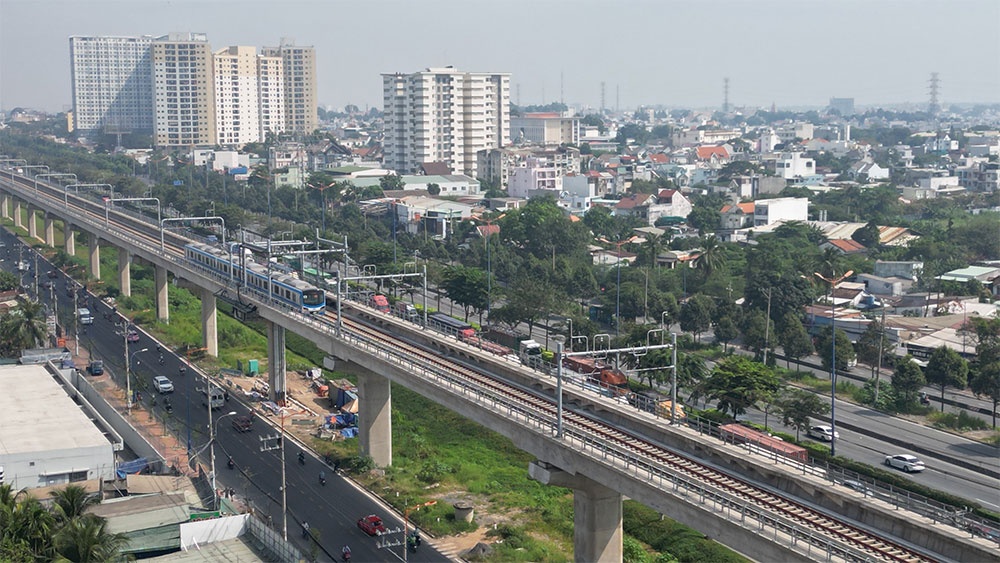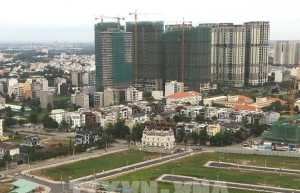Unpredictability stemming from housing market
At the end of 2022, Vietnam’s housing market has issued a clear message: high interest rates eliminate the possibility of purchasing a home at a decent price, and 2023 might be a difficult year for the mid- and high-end segments.
Buyers of a first home are currently eligible for a loan with a fair interest rate, and the unit price cannot exceed $76,000. This was the primary topic of a paper that the Ho Chi Minh City Real Estate Association (HoREA) presented to the Standing Committee of the National Assembly (NA) this month to resolve pressing problems in the real estate market.
 |
| Unpredictability stemming from housing market, illustration photo/ Le Toan |
The association suggests in the paper that the NA considers handing over budget resources to compensate for preferential credit interest rates for homeowners extended by commercial banks.
Nguyen Quoc Hiep, head of the Vietnam Association of Construction Contractors, said that it is “quite difficult” to purchase a property for roughly $1,270 per square metre in northern Vietnam. He believes that the current price of a 70-sq.m flat is around $90,000 in the north, well over the HoREA paper’s figure.
According to Hiep, constructing a home at those costs is currently impractical and the pricing is only appropriate for low-quality social housing without an elevator, he insisted.
Hiep observes that, while buying power has declined, prices have remained high because of restricted supply. The cost of materials and labour is also set to continue to rise and, after July 2023, the government is set to raise the minimum wage.
The view of the market by real estate investors indicates the future trend of the number of new homes that will be constructed. According to projections by the Ministry of Construction (MoC) for the period 2021-2030, Vietnam still needs 70 million sq.m per year of urban housing.
Given this circumstance, the lack of supply may lead to a rise in housing costs, and the number of people who are required to purchase a property will grow with the urban population, which is projected to increase by almost 45 per cent this decade.
Despite builders’ efforts to make homes more inexpensive to entice consumers, construction costs continue to climb. According to statistics issued by the MoC in July, the development investment rate for apartment buildings with up to five storeys and no basement grew by more than 7 per cent in 2021 compared to the previous year.
In the situation of difficult credit, increased loan interest rates, and larger capital costs, the costs of household appliances and furniture have not dropped due to difficulties in supply chains. Consequently, it is possible that the number of properties supplied to the market eventually will be relatively small. The Vietnam Association of Realtors has stated that real estate supply is on a declining trajectory in the mid- and high-end segments, as prices are not appropriate for the majority of people with real housing needs.
In the first nine months of 2022, the total housing supply reached 41,886 units, a decrease of 22 per cent from 2021 and a drop of 75 per cent from 2018. In the period, the average rate of absorption was just 43 per cent.
Vo Huynh Tuan Kiet, director of Residential Marketing for CBRE Vietnam, attributed the restricted housing supply and imbalance across segments to the rising cost of project construction. “The majority of items introduced to the market are centred in the high-end and luxury categories, whereas the mid-range and inexpensive segments are very restricted and lack solutions for low-income individuals and social housing,” Kiet said.
Real estate activity and consumer mood towards the housing market have decreased because the interest rate on social housing loans has increased to 5 per cent per year from 4.8 per cent per year, effective from the start of 2023. Homebuyers may need to consider affordability more carefully, Kiet added.
Techcombank now has the highest home loan interest rate among banks, at 10.59 per cent per year. PVcomBank and TPBank also provide cheap interest rates on house loans, at 5 per cent and 5.9 per cent per year, respectively. Whereas banks only give interest on the first 3-12 months, lending rates will either follow the market or be elevated to compensate. The variable interest rate will be similar to the term deposit rate for 12-13 months, adding 3 to 5 per cent. Many banks will add 3-5 per cent to the stated base rate on an annual basis.
Typically, peak sales season occurs towards the end of the year. But Tran Khanh Quang, general director of Viet An Hoa Real Estate Investment, said that the mood of homebuyers is poor due to increasing interest rates, stagnant credit, and a lack of expansion.
“Even still, it is a good moment for expert real estate investors, and firms with tremendous financial potential and cash, to manufacture acceptable goods and provide a variety of sales policies to entice purchasers,” Quang said.
 | Housing market to have brighter prospect this year: experts The Viet Nam Real Estate Brokerage Association forecasts the housing real estate market in 2021 to have more optimistic developments due to the effective prevention of the COVID-19 pandemic and domestic economic recovery momentum. |
 | Vietnam’s real estate sector continues record run: Forbes Vietnam’s real estate market recommenced its record run, with the industrial sector viewed as the star of the industry thanks to the country's success in combating COVID-19, said a story by Philip Heller published on Forbes earlier this week. |
 | Deeper capital focus required for real estate arena The domestic housing market is witnessing huge demand on the back of rapid urbanisation with a resounding population rate, but major difficulties remain such as legal procedures, land funds, and investment capital, leading to a mismatch between supply and demand. |
What the stars mean:
★ Poor ★ ★ Promising ★★★ Good ★★★★ Very good ★★★★★ Exceptional
Related Contents
Latest News
More News
- Construction firms poised for growth on public investment and capital market support (February 11, 2026 | 11:38)
- Mitsubishi acquires Thuan An 1 residential development from PDR (February 09, 2026 | 08:00)
- Frasers Property and GELEX Infrastructure propose new joint venture (February 07, 2026 | 15:00)
- Sun Group led consortium selected as investor for new urban area (February 06, 2026 | 15:20)
- Vietnam breaks into Top 10 countries and regions for LEED outside the US (February 05, 2026 | 17:56)
- Fairmont opens first Vietnam property in Hanoi (February 04, 2026 | 16:09)
- Real estate investment trusts pivotal for long-term success (February 02, 2026 | 11:09)
- Dong Nai experiences shifting expectations and new industrial cycle (January 28, 2026 | 09:00)
- An Phat 5 Industrial Park targets ESG-driven investors in Hai Phong (January 26, 2026 | 08:30)
- Decree opens incentives for green urban development (January 24, 2026 | 11:18)

 Tag:
Tag:





















 Mobile Version
Mobile Version